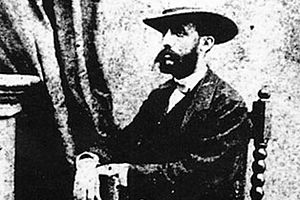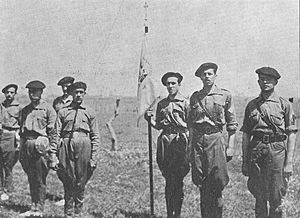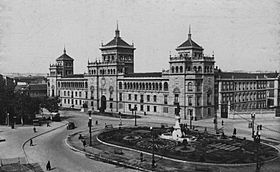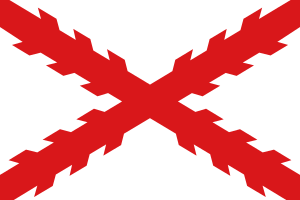Enrique Barrau Salado facts for kids
Quick facts for kids
Enrique Barrau Salado
|
|
|---|---|
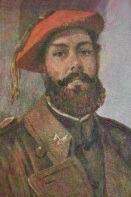 |
|
| Born | 1912 Seville, Spain
|
| Died | 1961 Seville
|
| Nationality | Spanish |
| Occupation | military |
| Known for | conspirator, military commander |
| Political party | Carlism |
Enrique Barrau Salado (born 1912, died 1961) was a Spanish military officer and a member of the Carlist movement. Carlism was a political movement in Spain that supported a different branch of the royal family for the throne. Enrique Barrau Salado is remembered for his part in a plan against the government in the 1930s. He also played a role in the military uprising in Seville in July 1936. Later, he became a commander of a special Carlist military unit called the requeté during the Spanish Civil War. After the war, he became a professional army officer and retired as a major. Even though he didn't join politics openly after the war, he remained an important figure for Carlists in Andalusia. Some characters in books have even been based on him.
Contents
Early Life and Family
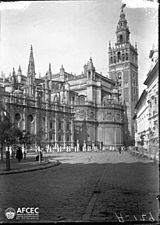
Enrique Barrau Salado came from a family with French roots. His great-grandfather, Jules Barrau, might have been part of a French army that helped Spain in the 1820s. Enrique's grandfather, Leoncio Barrau Galinier (1837-1924), was born in Toulouse, France. He studied in Seville and became a civil engineer who built roads. He was a respected person in Seville's wealthy class, known as the bourgeoisie. He managed railway companies and even bought an old convent to turn it into a food market. He was also interested in culture and owned theaters.
Enrique's father, Enrique Barrau Grande (1871-1930), studied medicine. He inherited parts of his father's railway business. He married Carmen Salado Iznaga (1879-1957), whose father was also a respected doctor in Seville. Carmen was a cousin of Mariano Mota Salado, who later became the head of the Seville University. Enrique Barrau Grande and Carmen had four children: Enrique (the oldest), Leoncio, Carmen, and Antonio. Enrique's father died in mysterious circumstances after selling most of his railway company shares.
We don't know much about Enrique's childhood or early schooling. However, his mother's family, the Salados, had a strong influence on him. Because he was often arrested and detained when he was young, it's not clear if he went to university. In 1933-1934, he received military training in Seville. We don't have information about his jobs before the Spanish Civil War.
In 1940, after the war, Barrau married Petra García Vélez (who died in 1973). They had five children: Enrique, Petra, Aurelio, Antonio, and Carmen Barrau García. None of them became famous public figures. However, Antonio and Aurelio continued to be active in the Carlist movement even into the 21st century.
Political Beginnings in the Republic
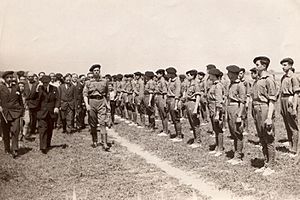
While we don't know the political views of Enrique's father's family, his mother's family were Traditionalists. Traditionalists in Spain believed in old customs and the monarchy. In 1930, when Enrique was 17, his uncle introduced him to Manuel Fal Conde, a leader of the Traditionalist movement in Andalusia. Enrique and Fal Conde became very close, almost like father and son.
Enrique joined the main Carlist organization, Comunión Tradicionalista. In 1932, he became the secretary of its new youth branch in Seville, called Juventud Tradicionalista. In the summer of 1932, he was involved in the Sanjurjo coup, which was a failed attempt to overthrow the government. He was arrested but soon released. However, he was arrested several more times in 1932 and 1933, often for taking part in anti-government protests. He was one of the Carlists who spent the longest time in jail during that period.
Fal Conde saw Enrique as one of the most promising young members of the movement. In 1933, Barrau became the secretary for the Carlist leadership in Andalusia. He traveled with Fal Conde to party events and even to a large Carlist gathering in Zumarraga. Also in 1933, he started organizing the Seville branch of the Carlist paramilitary group, the requeté. The requeté was a military-style organization for Carlist supporters.
After a year of hard work, the requeté organization in Seville was strong. They held an impressive show of strength at the Quintillo estate. About 600 uniformed members performed military drills and exercises. Barrau was one of the main speakers at this event. In 1934, he also helped send some Seville requetés to military training in Rome. At this time, he was already a member of the Carlist leadership in Seville.
From 1935, Barrau was the official commander of the First Requeté of Seville. This was a large paramilitary unit under the command of the Andalusian requeté leader, Luis Redondo. In 1936, the Carlist leader, Alfonso Carlos, recognized Barrau's efforts with a special award. In the spring of 1936, Barrau was very active in the Carlist plans to start a coup against the government. He gathered requeté volunteers in the countryside of Andalusia. The coup was eventually called off because the government found out about some of the plans and arrested some people. However, Barrau was not among those arrested.
Role in the Civil War
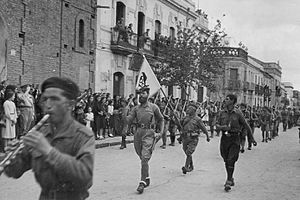
In early July 1936, Enrique Barrau and his brothers were deeply involved in discussions between the Carlists and the military. Their goal was to take control of Seville. Around midday on July 18, Enrique Barrau led a group of requetés who tried to take over the civil government building. They didn't succeed at first and had to retreat. But they returned in the early afternoon, supporting the rebel army's artillery units. After some fighting, they captured the building. In the following days, Barrau's home became a meeting point for requetés. He led his men in battles against workers' militias to gain control of Seville's Macarena, San Julián, and San Marcos districts.
From August to October 1936, Barrau took part in many requeté operations in western Andalusia. He commanded one of three companies in a battalion led by professional officers. First, Luis Redondo, and then José María García Paredes, led the battalion. Initially, the unit operated west of Seville in the Huelva province. They put down resistance in the Sierra de Aracena mountains and the Rio Tinto mining region. Then, they moved towards the Málaga province and fought for Saucejo as part of a group called "Columna Redondo." When the unit was renamed Tercio Virgen de los Reyes, Barrau was involved in operations on the Cordobese front in the Peñarroya-Pueblonuevo area. In October, the requetés captured the Anarchist stronghold of Bujalance and set up their headquarters there.
In November 1936, Barrau was called away from the front lines to join Fal Conde in Getafe and Leganés. Then, in Toledo, he helped plan a Royal Military Academy for Requetés. He might have even been considered to be one of its commanders. However, this plan failed because Franco stopped it and had Fal Conde expelled from the country. There is no information about any punishment for Barrau. In early 1937, he was back on the front lines, fighting first for Málaga and then, in the summer, again in the Bujalance-Lopera region. He strongly disagreed with the political unification forced by Franco and declared his loyalty to Fal Conde, who had been pushed aside. Later that year, he even thought about "war against the Blues" (referring to Franco's Falange party). He complained about Carlists being ignored and even organized small protests.
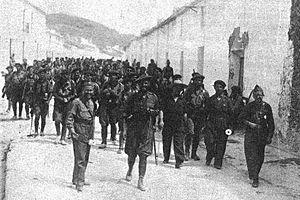
Despite his disagreements, in December 1937, Barrau was made an "acting captain." In early 1938, his unit moved to Extremadura and fought for Valle de la Serena, the Zújar river, and Castuera. In July, he was wounded, some sources say seriously, and spent some time recovering. After recovering, in January 1939, he returned to the front line. He commanded a company in a unit called "4th Battalion-Flag of FET de las JONS of Seville." At Peñarroya, Valsequillo, and Bélmez, his unit fought against the last Republican attack of the war. Barrau ended the war as a highly decorated officer. He received two Medallas de Sufrimiento por la Patria, a Medalla de Mérito Militar, a Cruz de la Orden de San Hermenegildo, and other group awards.
Life After the War
In the summer of 1939, Barrau decided to become a professional military officer. In July, he was accepted into the army right away. Even though he was officially a "reserve cavalry lieutenant," his temporary wartime promotion to captain was recognized, with his rank counting from May 25, 1938. As a captain, he was admitted to the Cavalry Academy in Valladolid in 1940. We don't have many details about his time at the academy or when he graduated, but it was likely in the early 1940s.
There is little information about where Barrau was stationed in the military. We know that in the early 1950s, he was assigned to the 7th Cavalry Regiment in Seville. He didn't rise very high in rank and was promoted only once, around 1952, from captain to comandante (major). We don't know why a previously distinguished officer had such a moderate career. At some point, he moved from active service to the reserve, attached to the 2nd Military Region in Seville. His last rank was cavalry major.
As a professional military officer in Franco's Spain, Barrau could not openly show his Carlist political beliefs. History books about Carlism after the war don't mention him being involved in building party groups or propaganda. However, in private, he stayed in touch with important Carlists in Andalusia, like his former commander Luis Redondo and the Carlist leader Manuel Fal Conde. Both of them thought very highly of him. Because of his actions during the war and his cheerful personality, he became an important figure for Seville's Traditionalists. Even young Carlists who supported Don Carlos Hugo felt it was important for the prince to meet Barrau when he visited Seville in the late 1950s.
In 1959, Barrau helped organize the 25th anniversary of the Quintillo parade. This event, with its independent Carlist feel, made the local government uneasy. In 1960, the Quintillo ceremony was explicitly banned by the civil governor, Hermenegildo Altozano Moraleda. Barrau went to his office but couldn't get the decision changed. Afterward, he made copies of the order and shared a long story about what happened. Despite this, many high-ranking military officers attended his very formal funeral. His widow received a special award. Even today, among Traditionalists, Barrau is seen as an iconic Andalusian requeté figure, described as "a Spanish captain in the old style of the Flanders or Lepanto regiments." In his 2020 novel Linea de fuego, Arturo Pérez-Reverte based one of his main characters, Captain Coll de Rei, on Barrau.
See also
 In Spanish: Enrique Barrau para niños
In Spanish: Enrique Barrau para niños


